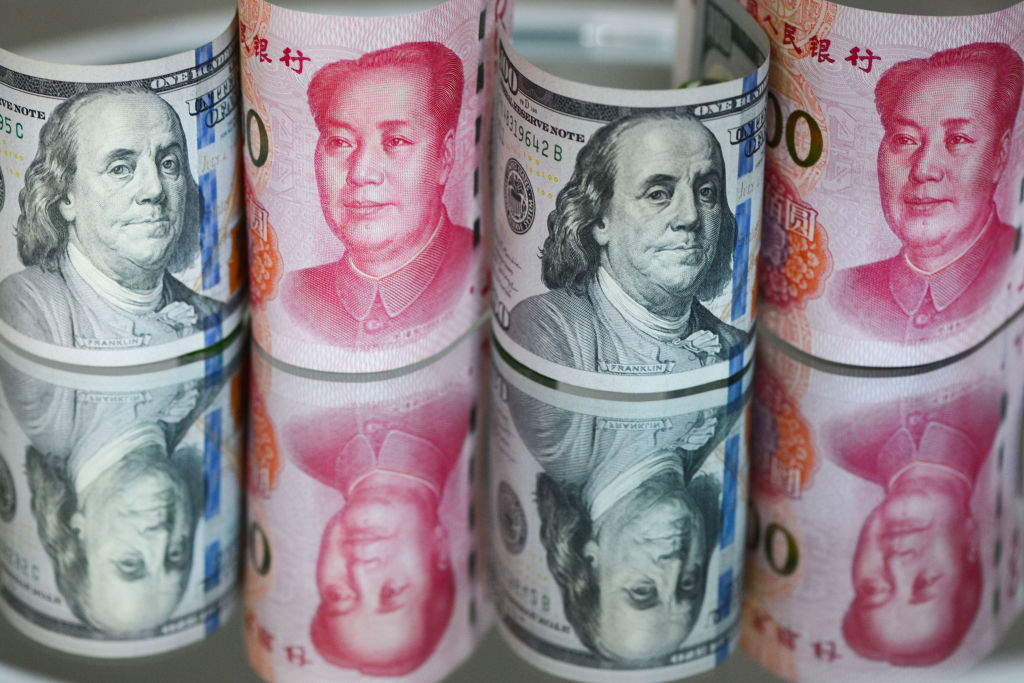Saudi Arabia and the United Arab Emirates turned heads and raised eyebrows when officials revealed that they were open to settling trade with China in yuan instead of dollars. Iraq is reportedly doing the same. This is another case in the global de-dollarization campaign that has accelerated over the last year since Russia’s invasion of Ukraine began. The US dollar hegemony is being threatened, and, at this point, there is almost no turning back for nations intent on dismantling the greenback’s might and influence in international commerce and geopolitical developments. But the dollar’s downfall leads to a broader question: Who succeeds it?
Iraq Dumps Dollars
Iraq’s central bank confirmed to Reuters that it is considering a plan to permit imports from China to be settled directly in yuan for the first time on record as part of the institution’s efforts to improve access to foreign currency. “It is the first time imports would be financed from China in yuan, as Iraqi imports from China have been financed in dollars only,” Mudhir Salih, the government’s economic adviser, told the newswire.
This comes a few months after President Xi Jinping demanded during the gulf summit in Riyadh that energy trade in the Middle East be settled in yuan in the coming years.
The central bank also noted that it could enhance the balance of Iraqi financial institutions that maintain accounts with their Chinese counterparts in yuan. The other option on the table would be to increase local banks’ balances through the central bank’s accounts with the Development Bank of Singapore (DBS) and JPMorgan Chase, effectively swapping dollars for yuan and paying the final recipient in Beijing.
In the last year, the nation has been struggling with a US dollar shortage in local markets, forcing officials to assess a currency revaluation in early February. The issue has been primarily the fault of Washington, with the Treasury Department and the Federal Reserve Bank of New York (FRBNY) enforcing robust controls on worldwide transactions by Iraqi commercial banks. These restrictions coerced Iraq to comply with SWIFT criteria in order to fight money laundering practices and “the illegal siphoning of dollars to Iran and other heavily sanctioned countries.” But this measure has devastated Iraq’s economy and resulted in most of the nation’s daily dollar wire transfers being denied.

(Photo Illustration by Sheldon Cooper/SOPA Images/LightRocket via Getty Images)
A Sign of Things to Come?
Russia has also suggested that it engaged with the Iraqi government to consider paying for crude oil in friendly currencies. In other words, no more dollars. “In the current conditions of United States currency restrictions upon our two countries, it is important to protect legitimate economic relations from pressure from the West by switching to paying for oil supplies in the currencies of other reliable countries,” said Foreign Affairs Minister Sergey Lavrov in a statement.
This is good news for China because Moscow is essentially doing Beijing’s bidding and performing all the leg work on the world stage.
For the last several years, the Chinese Communist Party (CCP) has been on a crusade to internationalize the yuan. From its Belt and Road Initiative (BRI) to the digitization of the currency, officials have been looking at every possible avenue to expand the yuan’s worldwide reach. While China’s efforts and these announcements from Middle Eastern markets will not institute immediate groundbreaking change, they are the first steps in the long road to diminish the US dollar’s international reserve currency status. In other words, the war on the dollar king will cause it to be dethroned.
Should America Care?
All these years, the reason why the US dollar has survived trillions in national debt, annual trillion-dollar deficits, $200 trillion in unfunded liabilities and expenditures, and trillions in money printing has been because of the dollar standard. The International Monetary Fund’s (IMF) Currency Composition of Official Foreign Exchange (COFER) shows that while the greenback’s representation in reserves has declined, it is still king of the mountain. There is still strong demand, especially if the US government is willing to hand you free money. But if the demand ceased, it would manufacture an inflationary headache for the world’s largest economy as these dollars would travel back into the US system.
This is why the de-dollarization push is a double threat to the American Empire. Not only would an alternative currency (or basket of currencies) replace the greenback, but it would also mean the US would drown in a sea of inflation. Will this happen tomorrow night? Nope. But could this become a legitimate threat in the next decade or two? Most likely.
Do you have an opinion about this article? We’d love to hear it! If you send your comments to [email protected], we might even publish your edited remarks in our new feature, LN Readers Speak Out. Remember to include the title of the article along with your name, city, and state.
Please respect our republishing guidelines. Republication permission does not equal site endorsement. Click here.

